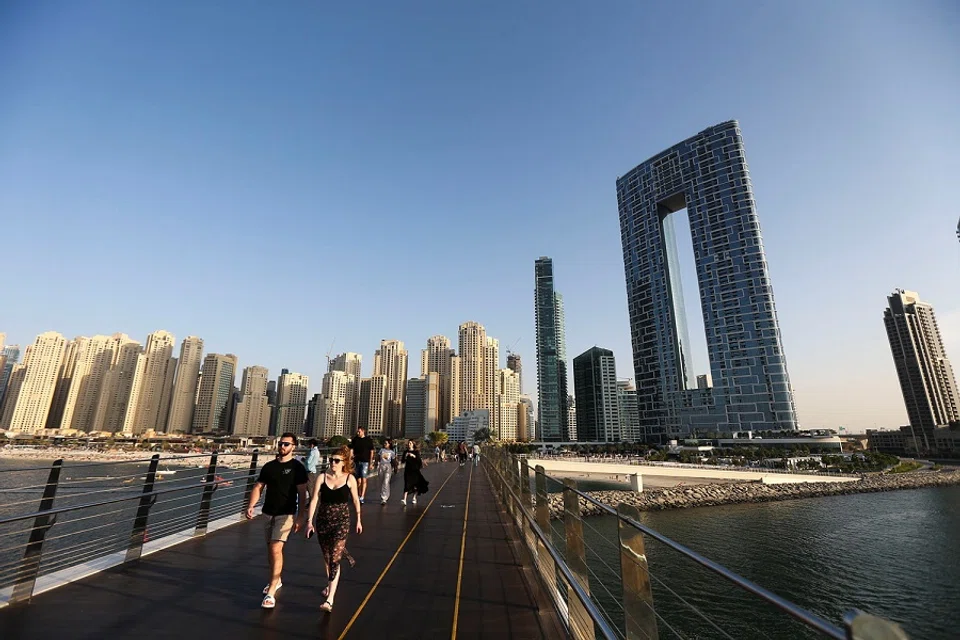US-China competition in the UAE: A tussle in the desert
Unlike the Soviet Union, China has an arsenal of economic tools at its disposal in wooing US allies. This is plainly seen in the UAE-China relationship, in which bilateral trade in 2021 was more than double that of UAE-US trade for the same period. Security and defence ties are also strengthening. As dictated by the laws of the free market, the one who offers the best deal wins. As such, the US will have to do better than just rely on coercive tactics.

The United Arab Emirates (UAE) is one of America's oldest and most reliable allies in the Middle East. For decades, its elite have been educated in the US. The country has purchased billions in American arms and its armed forces are trained by the US. However, in recent years this close relationship has come under increased strain.
The rise of China and its growing penetration of the Middle East is posing significant challenges to American primacy in such a strategically important part of the world. While the Soviet Union tried to challenge US dominance in the Middle East with its alliance with Egypt and Syria, its efforts ended in failure. China poses a far greater challenge to US primacy in the region than the Soviet Union ever did.
Strong China-UAE economic relations
In the past decade, Sino-UAE relations have witnessed a remarkable expansion. Lucrative and complementary burgeoning trade relations between the two countries laid the foundation for an ever-growing strategic partnership.
Despite the Covid pandemic in the first nine months of 2021, bilateral trade between the two countries reached US$49 billion, a 38.1% increase compared to the same period in the previous year. China imports primarily crude oil and related products from the UAE, while exporting machinery, construction materials and textiles. The UAE's bilateral trade with the US for the same period was US$17.1 billion, less than half that with China.
Chinese companies have won major projects in the infrastructure sector such as a US$2.4 billion deal by Chinese wholesale company Yiwu to build a logistics centre for the Dubai Expo. In 2019, Chinese company East Hope Group announced that it planned to invest US$10 billion in the Khalifa Industrial Zone Abu Dhabi (KIZAD).
Chinese companies have invested in real estate, renewable energy, healthcare and telecommunications. An estimated 180,000 Chinese nationals live in the UAE and the biggest Chinatown in the region is currently under construction.
The UAE, which is itself a target of occasional criticism by the West over its human rights record, sees China as a natural ally.

Mutually beneficial and profitable economic ties have paved the way for closer political and diplomatic relations. At a time when the US and its allies have strongly criticised China over its human rights record, the UAE has shown sympathy for China's position on issues such as Hong Kong and Taiwan.
Abu Dhabi's support is particularly appreciated on the Xinjiang issue. The UAE is a majority Sunni Muslim country. Ethnic Uighurs in Xinjiang whom the West accuses China of prosecuting are Sunni Muslims. Thus, support from a moderate and prosperous Muslim nation is highly appreciated by China. The UAE, which is itself a target of occasional criticism by the West over its human rights record, sees China as a natural ally.
Growing security and defence ties raises alarm bells
Closer economic and political ties have begun to pave the way to cooperation in security and defence matters. Growing numbers of UAE military officers have begun to go to China for military education. The two countries are cooperating more in areas such as intelligence sharing, counter terrorism and maritime security.
In November 2021, EDGE, the UAE's biggest defence company, announced a joint venture with Chinese state-owned company China National Aero-Technology Import and Export Cooperation to create the first regional distribution hub for aircraft logistics in Abu Dhabi. Under the agreement, the two sides will work on developing several military-related technologies. The UAE has purchased several armed aerial drones from China.
While the US grudgingly looked on as China supplanted them in trade and investment, Abu Dhabi's closer political and security ties with Beijing have raised alarm bells in Washington. Unable to compete with China on the economic front, the US began to apply diplomatic pressure on the UAE in an attempt to slow China's growing influence. In November 2021 several media outlets reported that the UAE government stopped the construction of a port facility by China after Washington complained that the facility was for military purposes. However, evidence of such a claim remains vague.
The UAE was unfazed by Washington's refusal to sell armed drones; in fact, it turned to China and acquired dozens of them.

While Abu Dhabi seems to have caved in to US pressure on the port facility, American coercive diplomacy has its limits. As did many other countries, the US raised the issue of Huawei's presence in the UAE. The US government claimed that the use of Huawei products by the UAE government could pose a threat to security ties between the UAE and the US. To pressure Abu Dhabi, Washington withheld the sale of sensitive technology such as drones and stealth fighters.
While such coercive diplomacy tactics may work on small countries highly dependent on US assistance, its usefulness against a wealthy and proud nation such as the UAE is rather questionable. Whereas in Panama, US pressure led to the cancellation of multi-billion dollar infrastructure projects signed between that country and China, in the UAE it blew up in Washington's face.
The UAE was unfazed by Washington's refusal to sell armed drones; in fact, it turned to China and acquired dozens of them. Today China has one of the most advanced drone industries in the world and has been able to develop some military drones even more advanced than those produced in the US. Not only are Chinese drones first class, they are cheaper.
The US hasn't learnt that coercive diplomacy will not work
However, the US failed to learn its lesson from the drone episode and continued to pursue the same coercive diplomacy tactics, this time using the sale of the highly sophisticated F35 stealth fighter as a pressure point.
The UAE Air Force intended to purchase 50 F35s from the US in a deal worth US$23 billion. However, the US raised several concerns over the UAE's relations with China and Huawei in particular. While Washington may have thought these concerns legitimate, the UAE authorities saw it as arrogant intrusion and being disrespectful of its sovereignty. After several failed attempts at settling the matter, Abu Dhabi announced in December 2021 that it was pulling out of the F 35 deal.
The case of the UAE demonstrates that the US can no longer rely on mere coercion and threats to counter Beijing's expansion. China is not the Soviet Union.

The case of the UAE demonstrates that the US can no longer rely on mere coercion and threats to counter Beijing's expansion. China is not the Soviet Union. Therefore, outdated Cold War coercive tactics will not work. The Soviet Union had very little to offer its allies apart from weapons and low-quality consumer goods. There was never a Soviet Huawei or a Belt and Road Initiative with billions to offer. The Soviet Union provided assistance only to countries that shared its ideology or were anti-West. Chinese companies have invested billions in the West and in the East, North and South regardless of ideology or political system.
Close ties with China pose many challenges to US allies, but also offer them enormous rewards that they are reluctant to relinquish. Unlike the US, China is not pressuring any country not to do business with the US. China is instead beating the US at its own game. Americans pride themselves on being the model of capitalism, under which those who make the best offer get the deal. In order to counter China's growing influence, the US will have to offer better deals and less threats. As an Indonesian minister observed: "The problem with the Americans is that they offer too many sticks and very few carrots."
Related: Chinese academic: Can China challenge the US's standing in the Middle East? | Chinese academic: China-Iran deal will benefit China, Iran and Middle Eastern countries in the long run | Battling atheist China: US highlights Xinjiang issue and religious freedom in Indo-Pacific region | China-Iran deal complements the BRI, but faces Iranian domestic opposition and US sanctions | China needs to reset its approach to the Palestinian issue - fast





![[Photos] Fact versus fiction: The portrayal of WWII anti-Japanese martyrs in Taiwan](https://cassette.sphdigital.com.sg/image/thinkchina/3494f8bd481870f7c65b881fd21a3fd733f573f23232376e39c532a2c7593cbc)